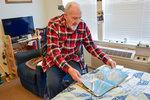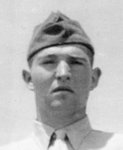


The end of the Second World War meant the end of operations for many in the U.S. armed forces, though for one former Battle Ground teacher, fence-builder and current Mallard Landing resident, a learning experience like no other was just about to unfold.
George Morris, who served in the Marine Corps for about two years in the Pacific Theater, speaks largely positively of his time as part of the U.S. forces occupying Japan following the drop of atomic bombs on Hiroshima and Nagasaki. He was there for about nine months, destroying Japanese military equipment while simultaneously picking up on Japanese culture and learning about the citizens of a nation that only months prior had been locked in conflict with the U.S.
How Morris got to Nagasaki was through island hopping crisscrossing the Pacific as U.S. forces gained ground. Born in 1922 in Colorado, Morris enlisted in May of 1944 at 21, relatively older than most recruits due to needing hernia surgery and the recovery period that followed.
Morris’ start in the Marines was rocky, finding himself in trouble before even leaving the mainland. Following boot camp in San Diego he spent a few days in Hollywood beyond the 48 hours of leave granted, leading to him being jailed. Morris said he spent time in the brig of a ship at Pearl Harbor, though eventually was released and he managed to stay out of trouble for the rest of his service.
From Pearl Harbor Morris made it to Saipan where the battle there was still going but dying down. Though initially trained to use the Browning Automatic Rifle, his discipline issues led him to work the commissary and guard duty, the latter of which had its fair share of close calls.
One incident in particular was during night guard duty that Morris had, keeping a spring from being contaminated by enemy troops. A fellow guard had heard possible enemy combatants and opened fire into the bush — in the darkness Morris could hear but not see anything including possible Japanese, but he held composure rather than make a rash decision.
Luckily no Japanese were able to find the spring, and through his service Morris managed to avoid being wounded by the enemy.
Morris spent about five months on Saipan before the next plan of attack, the invasion of Okinawa. He was a part of feigned landings U.S. forces used to throw off the Japanese from their actual attack on another side of the island.
Morris said that no one but some of the higher-level officials knew it was a feint — he and the other soldiers all thought they were going in for real. Packed into landing boats, it wasn’t until about 100 yards from the beach that the boats would veer off and return to the main ships, leaving Army and Marine forces without resistance for the actual invasion.
The tactic was successful, Morris said, and after only a few days Morris’ unit was called back to Saipan to help defend the island, which would be his last island-hopping before arriving in Nagasaki.
Morris’ experience in the war, especially the occupation of Nagasaki following the drop of atomic bombs on it and Hiroshima, was a combination of bearing witness to the horrors of war while also enjoying times of levity, connecting with the Japanese people and learning the humanity behind what was once the U.S.’ enemy.
In order to bridge the language barrier Morris picked up some Japanese, learning conversational phrases and even a few songs. In some cases the rapport soldiers had with the local citizens led to them working together to their mutual benefit, in some cases under the noses of military brass.
In one case after the order of a superior to not see any Marines on the city streets after dark Morris and some fellow soldiers got creative, acquiring kimonos through trade with locals and using what little Japanese they knew to pass by guards who would blow their cover.
Morris commented that their disguises were paid for not in money, but candy and cigarettes, the de facto currency of postwar occupation.
Compared to wartime, the Nagasaki occupation had a lot more downtime, which allowed for much more opportunities to drink. Following discharge from the Marines in July 1946 Morris was directionless and spending much of his time drinking on his Colorado family farm.
Morris said he didn’t drink because of any bad experiences in the war, though he did have some close calls; rather the relative ease of drinking in Nagasaki made him pick up the habit.
All that changed after the invitation of an old school friend who invited him to a youth group meeting where he had his first encounter with the Bible, having not grown up religious. What he learned in that one night would change his life.
“The next morning I woke up and I didn’t want to hit the bar,” Morris remarked, and a purpose in life that would bring him to Clark County was established.
After kicking the habit, Morris used the college education offered to him from his service to study agriculture, eventually earning a teaching certificate to begin his first of two post-military careers. He married his late wife, Ardith, in Colorado in 1956 and after a few years helping out back on the family farm he got the teaching certificate and taught a few years before moving to Southwest Washington where Ardith was from.
Morris began teaching a number of hands-on skills at Battle Ground High School in 1964, getting the job from a tip from Ardith who had taught English at the school prior to her Colorado move.
After retiring from teaching in 1980 Morris was not quite done, setting up a fence construction company after seeing the need by the number of horses in the area. He had taught fence-building as a teacher.
Though decades of life, two careers and starting a family has passed, the experiences from Nagasaki were still clear in Morris’ mind. He said was able to understand part of the national mentality and the religious devotion to the nation instilled in its subjects, so strong that teenagers would be trained to fly planes in kamikaze suicide missions as they were taught that dying for their country was the ultimate offering they could give to their nation.
Being in Japan after the atomic bombs dropped offers Morris a unique perspective, one more sympathetic to the plight of Japan’s people than a black-and-white understanding on conflict.
“After we saw that (devastation) it just changed us all; all of us realized what these poor people went through” Morris remarked.